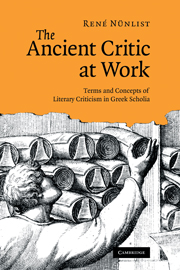Book contents
- Frontmatter
- Contents
- Acknowledgments
- Introduction
- PART I
- PART II
- 13 The gods in Homer
- 14 Homeric similes
- 15 Epithets
- 16 Type scenes
- 17 Homeric speeches
- 18 Reverse order
- 19 Staging, performance and dramaturgy
- Epilogue
- Glossary of Greek terms
- Editions of scholia
- Other abbreviations
- Bibliography
- Thematic index
- Index locorum
17 - Homeric speeches
Published online by Cambridge University Press: 29 August 2009
- Frontmatter
- Contents
- Acknowledgments
- Introduction
- PART I
- PART II
- 13 The gods in Homer
- 14 Homeric similes
- 15 Epithets
- 16 Type scenes
- 17 Homeric speeches
- 18 Reverse order
- 19 Staging, performance and dramaturgy
- Epilogue
- Glossary of Greek terms
- Editions of scholia
- Other abbreviations
- Bibliography
- Thematic index
- Index locorum
Summary
This chapter supplements the general points made in Chapter 3 with some of the more specific characteristics that ancient scholars discovered in the speeches of Homer in particular.
SPEECH INTRODUCTIONS AND THEIR FUNCTION
Homeric speeches are normally introduced and capped by speech formulae, which have a function similar to quotation marks in a modern text. At the same time, the speech introduction allows the narrator to give an idea of what the speech is going to be like. As a note on the line that introduces Odysseus' first speech to Nausicaa puts it:
προστίθησι δὲ τῶῃ ἀκροατῇ κανόνα τῶν εἰρησομένων λόγων. εἰσόμεθα δὲ εἰ κεκράτηκε τῆς ἐπαγγελίας.
(schol. HPQ Od. 6.148)He [sc. Homer] confers on the reader beforehand a standard for the following speech. But we will learn <only later> whether he [sc. Odysseus] succeeded with his address.
The note makes two observations. Firstly, the speech introduction provides the reader with a standard which he can apply to the speech (the implication probably being that this helps him to orient himself). Secondly, however, the information whether or not the speech fulfils its purpose is given only after the speech (e.g. in the capping formula).
The general point about Homeric speech introductions is made by Porphyry with considerably more detail and the explicit statement that this is a standard feature of Homeric speeches. The long note first states the general principle:
παρατηρεῖν δεῖ ὡς, ὅταν ἐκ προσώπου τινὸς ἐπάγειν λόγους μέλληῃ τινὰς ὁ ποιητής, προλέγει προσημαίνων οἷος ἔσται ὁ λόγος ἢ μεθ᾽ οἵας διαθέσεως λεγόμενος. οὕτω γὰρ ὅρον λαβόντες παρὰ τοῦ ποιητοῦ ἐπὶ τὰ αὐτὰ οἷς αὐτὸς παρήγγειλε τῶν λεγομένων ἀκουσόμεθα. (Porph. Quaest. Hom. I, pp. 86–7 Sodano; this is the text of ms. V, for textual variants see Sodano ad loc.). […]
- Type
- Chapter
- Information
- The Ancient Critic at WorkTerms and Concepts of Literary Criticism in Greek Scholia, pp. 316 - 325Publisher: Cambridge University PressPrint publication year: 2009



